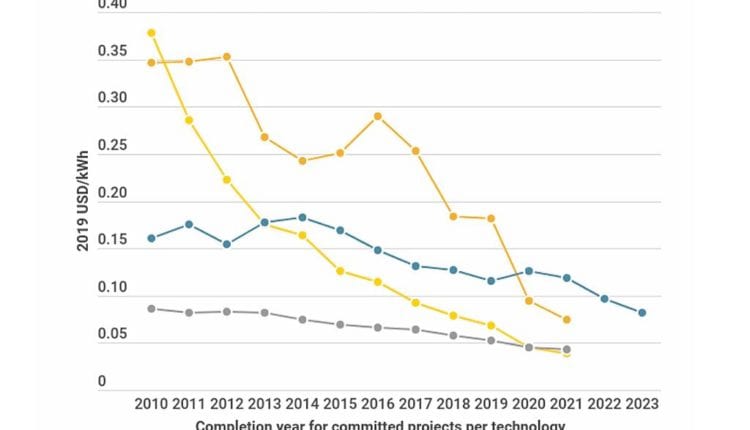
Cost comparison: renewable energies are increasingly beating fossil fuels such as coal
Auction prices at record low, electricity production costs radically reduced – renewable energies increasingly attractive.
Renewable energies are on the advance worldwide for purely economic reasons. The new study by IRENA, International Renewable Energy Agency, clearly shows the trend. Renewable energies such as wind and solar beat even the cheapest coal competitors in a cost comparison. Competitive electricity production costs of renewables make investments in this future technology extremely attractive – and will therefore play a decisive role in the measures to stimulate the economies of many countries.
The IRENA report „How Falling Costs Make Renewables a Cost-effective Investment“ (download see below) Costs of Renewable Energy Production in 2019 shows that more than half of the new renewable energy capacity added in 2019 has lower electricity costs than the cheapest new coal-fired power plants.
The report also shows that new renewable energy projects are increasingly undercutting existing coal-fired power plants.
Switching from the most expensive 500 gigawatts of coal to solar and onshore wind power would reduce electricity system costs by up to $23 billion each year and cut annual emissions by about 1.8 gigatons (Gt) of carbon dioxide (CO2), which is equivalent to 5 percent of total global CO2 emissions in 2019. It would also result in an investment incentive of $940 billion USD, which is about one percent of global GDP.
We have reached a break in the energy turnaround. New coal-fired power plants and a large part of the existing coal-fired power generation can no longer be justified either ecologically or economically. The strategy for global economic recovery must be green.
Francesco La Camera, Director General of IRENA

Martin Ulrich Jendrischik, Jahrgang 1977, beschäftigt sich seit mehr als 15 Jahren als Journalist und Kommunikationsberater mit sauberen Technologien. 2009 gründete er Cleanthinking.de – Sauber in die Zukunft. Im Zentrum steht die Frage, wie Cleantech dazu beitragen kann, das Klimaproblem zu lösen. Die oft als sozial-ökologische Wandelprozesse beschriebenen Veränderungen begleitet der Autor und Diplom-Kaufmann Jendrischik intensiv. Als „Clean Planet Advocat“ bringt sich der gebürtige Heidelberger nicht nur in sozialen Netzwerken wie Twitter / X oder Linkedin und Facebook über die Cleanthinking-Kanäle ein.